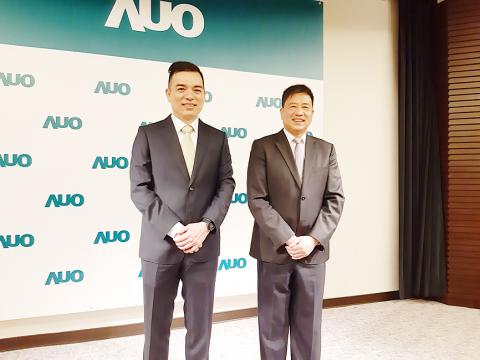Flat-panel maker AU Optronics Corp (AUO, 友達光電) yesterday said the COVID-19 outbreak has not dented customer demand or halted production, but the industry might face more headwinds after the second quarter, as the pandemic is escalating in the US and Europe, two of the world’s largest consumer electronics markets.
The virus outbreak is likely to last longer than most people thought, the company said.
“It is unavoidable that the pandemic will affect the global economy this year. It is difficult to gauge how big the effect will be,” AUO chairman Paul Peng (彭双浪) told reporters in Hsinchu.

Photo: CNA
The outbreak has not yet affected manufacturing, as AUO’s customers have continued to replenish their TV panel inventories, which helped boost panel prices in the first quarter, Peng said.
Demand for TVs might remain unscathed, even if the Tokyo Olympic Games are changed, as long as the Games are staged behind closed doors, he said.
“The company did not suspend any production lines in Taiwan or China during the Lunar New Year holiday. All of our production lines operated normally,” he said. “First-quarter financial performance should be in line with our forecast.”
AUO last month said that shipments of flat panels for TVs and PCs would drop 5 percent quarter-on-quarter this quarter, while average selling prices for the panels would climb about 5 percent due to a better product mix.
The initial outbreak had primarily affected supply chains and logistics, as China restricted transportation to curb the spread of the virus, Peng said.
The company has helped its suppliers of materials and components to resume production in China, he added.
However, it still took much longer than expected to ship products to customers due to large-scale lockdowns in China, Peng said, adding that it took about seven days to ship products to customers in Chongqing from a factory in Jiangsu Province’s Suzhou, as opposed to the two days usually required.
To minimize logistics risks, AUO is assessing the feasibility of allocating production in other facilities, Peng said.
However, some consumer electronics might become pricier due to supply chain shifts, he said.
AUO has resumed 95 percent of its production and the situation would become even healthier next month as suppliers are restoring production, AUO president Frank Ko (柯富仁) said.
On the plus side, the company said that it had seen strong demand for displays used for interactive whiteboards and tablets, as schools began offering distance learning to students after closing campuses amid the coronavirus outbreak.
There is also incresaed demand for displays used in medical devices, the company said.

SEEKING CLARITY: Washington should not adopt measures that create uncertainties for ‘existing semiconductor investments,’ TSMC said referring to its US$165 billion in the US Taiwan Semiconductor Manufacturing Co (TSMC, 台積電) told the US that any future tariffs on Taiwanese semiconductors could reduce demand for chips and derail its pledge to increase its investment in Arizona. “New import restrictions could jeopardize current US leadership in the competitive technology industry and create uncertainties for many committed semiconductor capital projects in the US, including TSMC Arizona’s significant investment plan in Phoenix,” the chipmaker wrote in a letter to the US Department of Commerce. TSMC issued the warning in response to a solicitation for comments by the department on a possible tariff on semiconductor imports by US President Donald Trump’s

‘FAILED EXPORT CONTROLS’: Jensen Huang said that Washington should maximize the speed of AI diffusion, because not doing so would give competitors an advantage Nvidia Corp cofounder and chief executive officer Jensen Huang (黃仁勳) yesterday criticized the US government’s restrictions on exports of artificial intelligence (AI) chips to China, saying that the policy was a failure and would only spur China to accelerate AI development. The export controls gave China the spirit, motivation and government support to accelerate AI development, Huang told reporters at the Computex trade show in Taipei. The competition in China is already intense, given its strong software capabilities, extensive technology ecosystems and work efficiency, he said. “All in all, the export controls were a failure. The facts would suggest it,” he said. “The US

The government has launched a three-pronged strategy to attract local and international talent, aiming to position Taiwan as a new global hub following Nvidia Corp’s announcement that it has chosen Taipei as the site of its Taiwan headquarters. Nvidia cofounder and CEO Jensen Huang (黃仁勳) on Monday last week announced during his keynote speech at the Computex trade show in Taipei that the Nvidia Constellation, the company’s planned Taiwan headquarters, would be located in the Beitou-Shilin Technology Park (北投士林科技園區) in Taipei. Huang’s decision to establish a base in Taiwan is “primarily due to Taiwan’s talent pool and its strength in the semiconductor

French President Emmanuel Macron has expressed gratitude to Hon Hai Precision Industry Co (鴻海精密) for its plan to invest approximately 250 million euros (US$278 million) in a joint venture in France focused on the semiconductor and space industries. On his official X account on Tuesday, Macron thanked Hon Hai, also known globally as Foxconn Technology Group (富士康科技集團), for its investment projects announced at Choose France, a flagship economic summit held on Monday to attract foreign investment. In the post, Macron included a GIF displaying the national flag of the Republic of China (Taiwan), as he did for other foreign investors, including China-based